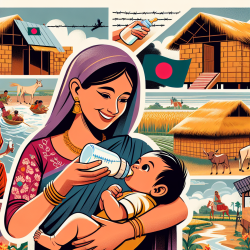In the realm of global health, understanding the unique challenges faced by adolescent girls and young women is crucial for developing effective interventions. A recent study titled "A qualitative study exploring perceived barriers to infant feeding and caregiving among adolescent girls and young women in rural Bangladesh" sheds light on these challenges, offering valuable insights for practitioners looking to enhance their skills and improve outcomes for mothers and children.
The Study's Focus
This qualitative study delves into the experiences of 70 adolescent girls and young women participating in a community-based empowerment program in rural Bangladesh. Through focus group discussions and semi-structured interviews, the research identifies key barriers to optimal infant feeding and caregiving.
Key Barriers Identified
- Early Marriage: Many participants highlighted early marriage as a significant barrier, leading to physical and emotional unpreparedness for childcare.
- Poverty: Economic constraints limit access to nutritious foods, impacting both maternal health and child nutrition.
- Rural Life: Participants perceived rural environments as less conducive to optimal childcare due to limited resources and opportunities.
- Time Conflicts: Balancing household duties with childcare responsibilities poses significant challenges.
- Short Birth Intervals: Closely spaced pregnancies hinder breastfeeding practices and overall child care quality.
Implementing Research Insights
The findings from this study offer several pathways for practitioners to enhance their approach:
- Cultural Sensitivity: Understanding the cultural context of early marriage and its implications on caregiving can help tailor interventions that respect local norms while promoting healthier practices.
- Nutritional Education: Providing targeted education on affordable, nutritious food options can empower young mothers to make informed decisions despite economic constraints.
- Sustainable Support Systems: Developing community-based support systems that involve family members, especially mothers-in-law and male partners, can alleviate time conflicts and promote shared caregiving responsibilities.
The Call for Further Research
This study underscores the need for continued research into the specific needs of adolescent girls in rural settings. Practitioners are encouraged to explore further into areas such as self-efficacy in caregiving, the impact of urban migration on family dynamics, and the role of peer support networks. Such research can inform the development of holistic programs that address both immediate needs and long-term empowerment goals.
If you're interested in delving deeper into this topic, I highly recommend reading the original research paper. To read the original research paper, please follow this link: A qualitative study exploring perceived barriers to infant feeding and caregiving among adolescent girls and young women in rural Bangladesh.










